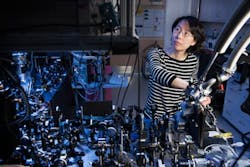Stanford physicists develop very efficient electrically pumped polariton laser
Palo Alto, CA--An international research team led by Stanford University's Yoshihisa Yamamoto has demonstrated an electrically driven polariton laser that could significantly improve the efficiency of lasers.
The system makes use of the physical properties of bosons. The polariton laser pairs electrons with "holes" to form excitons. These excitons are bosons, and as a result an unlimited number of them can inhabit any given energy level. Using bosons in lasers has been a scientific goal for decades, but Yamamoto's team is the first to successfully build an electrically pumped laser using bosons. (The result was recently reproduced and confirmed by scientists at the University of Michigan, who published their work in the journal Physical Review Letters.)
"We've solidified our physical understanding, and now it's time we think about how to put these lasers into practice," says physicist Na Young Kim, a member of the Stanford team. "This is an exciting era to imagine how this new physics can lead to novel engineering."
Electrically driven polariton lasers, Kim said, would operate using one-hundredth of the power of conventional lasers and could one day be used in many places from consumer goods to quantum computers. The work is detailed in the May 16 issue of Nature, and was conducted in collaboration with the National Institute of Informatics in Tokyo, Japan, and a team from the University of Würzburg in Germany, led by physicist Alfred Forchel.
The current polariton laser can run only at a chilly 4 K and requires constant cooling by liquid helium to prevent the excitons inside the gallium arsenide semiconductors from being pulled apart by thermal energy.
Aiming for room-temperature operation
The team hopes switching to a material that requires more energy to break apart excitons will allow them to build polariton lasers that work at room temperature, an important step toward widespread use.
"We're hoping we can replace conventional semiconductor lasers with these polariton lasers in the future," Kim says. The polariton laser is already being used by Stanford researchers developing quantum computers and quantum simulators. Kim believes similar lasers will be available to those outside the scientific community within the next five to ten years.
Source: http://news.stanford.edu/news/2013/may/kim-polariton-laser-052013.html
About the Author
John Wallace
Senior Technical Editor (1998-2022)
John Wallace was with Laser Focus World for nearly 25 years, retiring in late June 2022. He obtained a bachelor's degree in mechanical engineering and physics at Rutgers University and a master's in optical engineering at the University of Rochester. Before becoming an editor, John worked as an engineer at RCA, Exxon, Eastman Kodak, and GCA Corporation.

